
The average patient now takes antidepressants for 50 per cent longer than they did in the 1990s with some staying on pills for decades, a new study has shown.
The prescribing of antidepressants is currently rising at around seven per cent a year, which has led to fears that depression is on the rise, or that doctors are handing out pills too liberally.
But although the numbers of prescriptions has rocketed, since 2001 the number of people taking the drugs has largely plateaued.
What is behind the increase is the growing number of people who are staying on antidepressants for years at a time, or asking to return to pills when times are tough, a new study has shown.
The average time that a person is on drugs is now nearly six months (169 days) compared to just under four months (112 days) in 1995. One in four users take pills for an average of 15 months compared with eight months 20 years ago, according to a study by UCL published in The British Journal of Psychology.
Glyn Lewis, Professor of Psychiatric Epidemiology at University College Hospital’s Division of Psychiatry said he knew of people who had been taking antidepressants or 20 years.
“The number of prescriptions for antidepressants has risen quite dramatically since the early 1990s, and has been going up by around six or seven percent a year,” he said.
“It isn’t as though other psychiatric drugs have shown this rise, it’s a phenomenon just for antidepressants.
“Are we getting more depressed? Well we’re probably getting slightly more depressed but certainly not enough to explain this massive increase.
“Up to 2000 the number of people getting a prescription was increasing but the recent increase seems to be more about people staying antidepressants for longer.
“People are taking them for decades. Many people find it difficult to come off antidepressants.”
In 2005 the NHS in England prescribed around 30 million prescriptions for antidepressants each year, but by 2015 that figure had soared to 61 million at a cost of £285 million a year. It is the biggest increase in prescribing for any class of drugs used by the health service.
Current guidelines by the National Institute for Health and Care Excellence (Nice) state that people should take antidepressants for six months per depressive episode, or a maximum of two years if symptoms do not improve.
But increasingly patients are being placed on ‘maintenance’ treatment programmes to prevent future relapses, or ask to go back on pills if they know they are about to encounter a stressful situation, even if they are not currently depressed.

Guy Goodin, Professor of Psychiatry at the University of Oxford said: “I had an example of a guy who was an academic in Oxford and he told me he knew that in order to get publication finished he would have to be on antidepressants because otherwise he would be too anxious and unable to cope.
“Some patients will tell you that when they’re under pressure that they need to have normal level of anxiety of distress backed off so I know that I can cope with what’s coming up.
“People live their lives in a state of various stresses and sometimes with the best will in the world those stresses can’t be made to go away.”
Mental health charities have also raised concerns that antidepressants are often doled out because they are cheaper and there are long waits for other help, such as counselling.
Last year a report found that one in 10 patients seeking talking therapies waits more than a year before their needs are even assessed.
Prof Lewis said antidepressants were often used by doctors because they were a quicker option than talking therapies.
“The point with antidepressants is it is very quick and easy,” he said. “In psychotherapy, the patient has to be assessed for suitability then they’ve got the bother of turning up somewhere every week and having rather painful conversations with people.
“It’s not about being fobbed off, antidepressants are a much easier and convenient treatment that is readily available, that day in a way that psychotherapy is not.
“Obviously there is concern about over-prescription and I’m involved in trying to research this question."
However charities said talking therapies were often not available.
Stephen Buckley, head of Information at mental health charity Mind, said: "We must remember that while antidepressants can be very effective for some, they are not the solution for everyone and usually they shouldn't be used as a first-line treatment for mild depression.
"Talking therapies still aren't available to everyone who needs them. It's also likely that some areas of the country with particularly high prescription rates simply don't have other forms of treatments as readily available."
Dr Kate Lovett, dean of the Royal College of Psychiatrists, added: "For many milder episodes of depression talking therapies will be recommended as the first line.
“However, There is evidence that for people who have recurrent episodes of depression longer use of antidepressants reduces incidence of relapse and in certain situations this will be clinically appropriate.
“Antidepressants are used in the treatment of both depression and anxiety disorders. They are an evidence based treatment for moderate to severe depression and their prescription should be reviewed regularly in line with clear national guidance.
“It is vitally important that patients are able to choose evidence-based treatments for mental health conditions.”


0 comments: